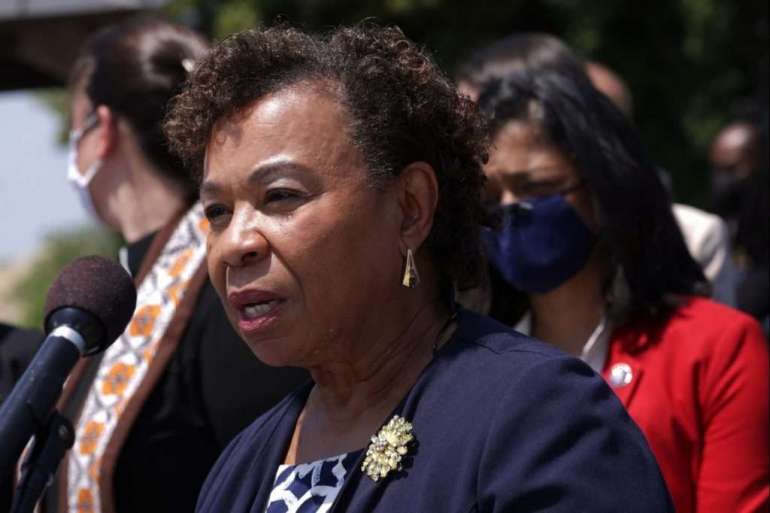Democrats are stuck on abortion and gun control. They have a backup plan

President Joe Biden is expected to call on Congress in his budget proposal this week to ditch the 45-year-old ban on abortion funding, after supporting that prohibition throughout his career. But Biden’s recent reversal on the Hyde amendment won’t be enough to overcome the Senate, where moderates like Sen. Joe Manchin (D-W.Va.) oppose repealing the ban and Democrats ultimately need Republican support to enact spending bills.
“Every indication is that it has a slim chance in the Senate,” Rep. David Price (D-N.C.), a top House appropriator, said of the effort to nix the abortion spending ban in particular. “But that doesn’t mean that, at certain points, you don’t stand up for it.”
Democrats are planning budget boosts for sexual and reproductive health services, family planning and teen pregnancy prevention, hoping some of those issues will be more palatable for Republicans and moderates in passing a raft of bipartisan spending bills. They’re also hoping to build on millions of dollars allocated for gun violence research in recent years, after the long-held Dickey amendment chilled studies on the issue for more than two decades.
Because the Hyde amendment prevents federal money from being spent to perform abortions, it blocks low-income women from paying for the procedure through government programs like Medicaid. The main workaround for pro-choice lawmakers: pour money into grant programs that fund clinics like Planned Parenthood.
“There’s a lot we can do without addressing Hyde directly that will be important to supporting women’s access to reproductive choices,” said Sen. Jeanne Shaheen (D-N.H.).
Democrats are now eyeing significant funding increases for the Title X family planning program. Biden has asked for $340 million to that end, a nearly 19 percent increase over current funding.
Shaheen, a member of the spending panel that funds the State Department and foreign programs, also wants Congress to spend more money on international family planning work, including through the U.N. sexual and reproductive health agency currently funded at about $33 million.
“It’s hard for me to understand why there seems to be such opposition to increasing support for family planning,” Shaheen said. “It improves the health of mothers and babies around the world. So, I’m hopeful we can do that.”
Federal cash runs dry on Sept. 30, and House Democrats are expected to pass their initial slate of spending bills in July without the abortion funding ban.
But unlike a massive infrastructure plan — which Democrats can try to advance without GOP support — any deal to keep the government open will eventually require buy-in from at least 10 Senate Republicans, meaning a fight over scrapping the Hyde and Dickey amendments could stall the annual spending bills or force a government shutdown.
“It’s a principled choice,” Price said of opposing the funding bans. “But in the end, there also has to be a practical choice to get the bills through.”
Even the return of earmarks isn’t enough to get GOP lawmakers to relinquish the longstanding Hyde provision that has largely served as a truce between both parties, smoothing over an issue that could easily throw government funding into chaos.
“I could get every earmark I wanted, but if Democrats take the Hyde amendment out of the Labor-H bill, I certainly wouldn’t vote for it, and I don’t think any pro-life Republican would,” said Rep. Tom Cole (R-Okla.), the ranking Republican on the House panel that oversees funding for the departments of Labor, Health and Human Services, and Education.
Progressives and abortion rights advocates say even symbolic support for eliminating the Hyde amendment is progress. Congress must “begin to lay down markers” recognizing that the Democratic base largely wants to toss the provision, said Destiny Lopez, co-president of the abortion rights advocacy group All* Above All.
“This is deeply a racial justice and economic justice issue,” Lopez said. “It’s one of the harshest remaining barriers to abortion access that Congress actually controls.”
Rep. Barbara Lee (D-Calif.), who co-chairs the Pro Choice Caucus, said progressive Democrats will keep fighting until they have enough votes in both chambers to torpedo the provision for good.
“It affects Black and brown women disproportionately,” Lee said of the Hyde amendment. “We’re not going to stop.”
In recent years, progressives have had more success in their effort to diminish the Dickey amendment that debuted in 1996 and has been re-upped every year since. While the amendment bans the CDC from advocating for gun control and has served to stall research on the subject for more than two decades, Democrats in 2018 altered the language to explicitly allow the public health agency to study gun violence.
Then in 2019, Congress for the first time provided funding specifically for that cause, spending $25 million. House Appropriations Chair Rosa DeLauro (D-Conn.) told CDC officials during a hearing this week that she wants “a progress report” on those research efforts.
Even though the Dickey amendment remains intact, Democrats say the new language substantially eases the policy that once ground gun violence research to a halt. To build on that victory, they now plan to provide billions of additional dollars across federal agencies to bolster research, gun violence prevention initiatives and background check systems, while encouraging states to adopt gun licensing laws and establish voluntary gun buyback programs.
“Gun deaths continue to occur at a staggering rate in our country,” Attorney General Merrick Garland told House appropriators this month in asking for $232 million in additional funding to combat gun violence. “This is both a law enforcement issue and a public health issue.”